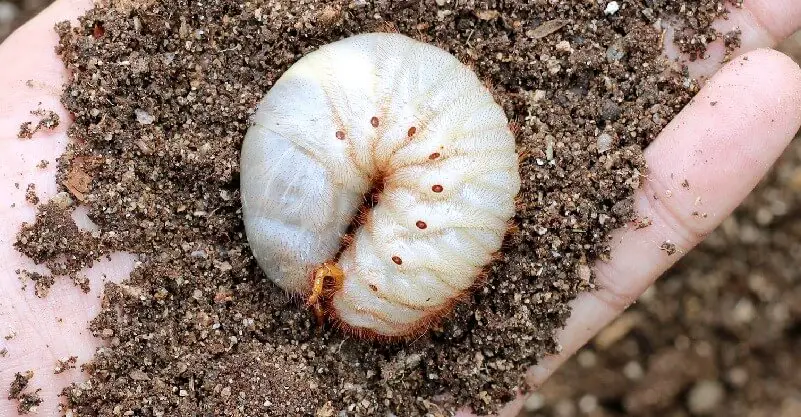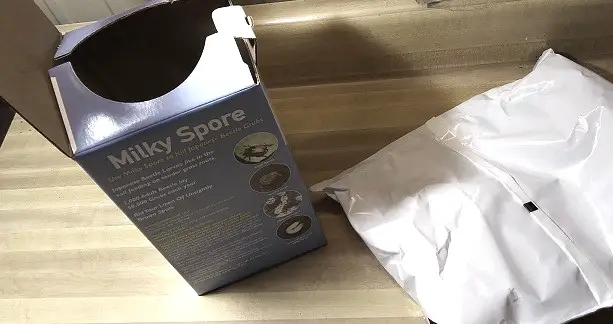Milky Spore Powder vs Granules
Milky spore is a popular organic grub-killer used in yards across the United States. The product, made from Bacillus popilliae bacteria, has proven effective against Japanese Beetle grubs without harming other soil organisms.
However, when it comes to milky spores, there are two options: powder and granules. This article will examine the differences between the two forms of milky spore and determine which is better based on application, effectiveness, and cost.
Milky Spore vs Granules Table
We will discuss the pros and cons of each option and help you decide which is best for your needs.
Powder | Granules |
Made In The USA | Made In The USA |
10 oz Treats Up To 2500 Square Feet | 20 Lb. Bag Treats 7,000 Sq. Ft. |
Continue Killing the Grub upto 20 Years | Continue Killing the Grub upto 20 Years |
Does Not Harm Beneficial Insects Man Or Animals | Does Not Harm Beneficial Insects Man Or Animals |
Use One Teaspoonful Or Powder Every 4 Feet In Your Lawn | In The Granules, You Need To Apply This Twice Per Year For Two Or Three Years |
It has Natural Bacteria Which Eats The Grub From The Inside | It has Natural Bacteria Which Eats The Grub From The Inside |
It Kill Japanese Beetle, June Beetle And Other Lawn Grubs | It Kill Japanese Beetle, June Beetle And Other Lawn Grubs |
Kills The Grub Stage Of The Japanese Beetle | Kills The Grub Stage Of The Japanese Beetle |
Applying Method
Milky spore powder only requires one application, making it a convenient choice for quick treatment. In contrast, milky spore granules require six applications spread over two years, demanding more of a time commitment.
Cost-Effectiveness
In terms of cost, milky spore powder takes the lead. It is less expensive than milky spore granules. For the same coverage area, using milky spore granules could be about five times more expensive than using the powder form due to the increased number of applications required.
Application Methods
When it comes to application, the powder form is typically applied using an applicator tube, placing 1 teaspoon (5 ml) on the soil in a grid, every 4 feet (120 cm). On the other hand, the granular form can be conveniently spread using a broadcast spreader.
Time to Full Strength
While both forms take time to reach full strength as the bacteria multiply and spread through the soil, the granules require a more extended application period of two years. This could be a crucial factor for those looking for quick results.

Effectiveness
Both the powder and granular forms of milky spore are equally effective in killing Japanese Beetle grubs, offering reliable pest control.
Organism Safety
Whether in powder or granular form, milky spore only harms Japanese Beetle grubs, making it safe for other organisms including people, animals, and other soil organisms like earthworms.
Longevity
Once established, the Bacillus popilliae bacteria in both forms can continue to kill grubs for up to 20 years. This makes milky spore a long-term investment for maintaining healthy, grub-free lawns.
Eco-friendly
Milky spore, in both its forms, is organic, safe, and environmentally friendly, making it an excellent choice for eco-conscious gardeners dealing with the invasive species of Japanese Beetles.
Coverage Area
A 10 oz container of milky spore powder can treat an area of 2,500 square feet, and a 40 oz container can treat an area of 10,000 square feet. In contrast, Milky Spore Granular of 20 lbs treats up to 7,000 sq. ft., providing ample coverage for most home lawns.
Compatibility
Milky Spore Powder stands out for its resilience to adverse environmental conditions such as freezing, and compatibility with most fertilizers, pesticides, herbicides, and other lawn chemicals. Despite the longer application period and higher cost, milky spore granules can be more convenient and easier to handle, especially for large or uneven areas.
Is Milky Spore Harmful To Bees Or Other Pollinators?
Milky spore does not harm bees or other pollinators. It specifically targets Japanese Beetle grubs and does not affect earthworms or other soil organisms. Milky Spore is a safe and effective organic pest control and lawn care option.
Can Milky Spore Be Used In Around Edible Plants?
Milky spores can be used in vegetable gardens, but it is important to avoid applying it directly to edible plants. Milky spore is safe for use in yards and does not harm plants, soil, or humans.
Will Milky Spores Also Control Other Lawn Pests?
Milky spore is effective against Japanese Beetle grubs and does not control other types of lawn pests, such as chinch bugs or cutworms. Its powder form is recommended over granules and is safe for yard use, preserving the environment.
Our Observation
Milky Spore Powder stands as the superior choice due to its convenience, cost-effectiveness, and versatility. While both forms are equally effective and eco-friendly, the powder only requires a single application instead of six applications for granules over two years.
This, coupled with the powder’s lower cost, significantly enhances its appeal. Additionally, the powder form’s resilience to freezing conditions and compatibility with common lawn chemicals increase its utility, making it an excellent long-term investment for pest control in various environments. Despite the granules’ ease of spread, their higher cost and longer application time reduce their overall appeal.
Related Article

James E. Butkovich, Pest control maven with a knack for eco-friendly & Chemical solutions. Blogger with a mission to make homes pest-free, one post at a time.

